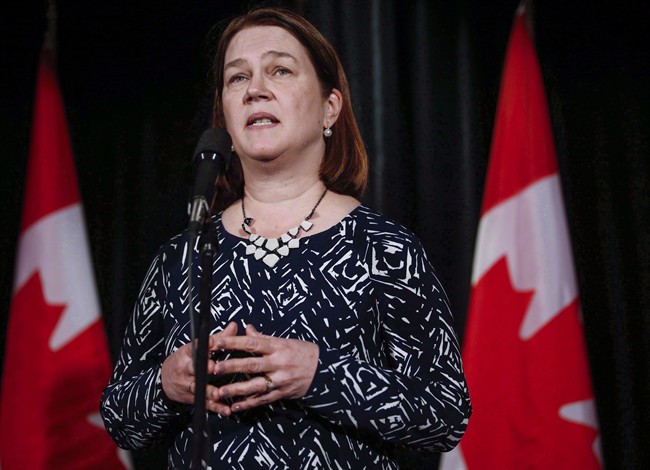OTTAWA – The federal government has reached health funding agreements with Quebec, Ontario and Alberta, Health Minister Jane Philpott said Friday – a significant reversal of fortunes after months of negotiations and threats of walkouts at meetings last year.

Philpott confirmed the deals – which leave Manitoba as the only remaining provincial holdout – with a wide grin and high-fives with her fellow cabinet ministers during the daily question period.
She later denied that the government used a “divide-and-conquer” strategy against the premiers and their once-united front against Ottawa’s planned reductions in annual health transfer payment increases.
READ MORE: Provinces, territories take a pass on Trudeau government’s health care funding offer
“They have, in their own time, come to an agreement with us,” Philpott said.
Part of the new agreement with Alberta includes $6 million to assist the province in its fight against an escalating opioid crisis.
Quebec Premier Philippe Couillard lauded Ottawa for acknowledging his province’s “distinct” character and accepting the “principle of asymmetry,” which he said will allow Quebec to use federal transfers as it sees fit.
“Since 2004 it’s been a major gain for Quebec, and this is still the case,” he said in Saguenay, Que.
“I think we can say it’s even been improved. My job will always be to make sure Quebec’s distinct character is recognized and highlighted in concrete fashion.”
Asked at a news conference Friday in Houston about the deals in general and Couillard’s comments in particular, Prime Minister Justin Trudeau insisted the agreements were a “very big win” for federalism and for Canadians.

Get weekly health news
READ MORE: Canada’s health care system needs money, and fast: Quebec minister
“The fact that we have provinces who have agreed that making historic investments in home care and in mental health is important for our communities, for our families and our economic productivity, for our society, is a very big win,” he said.
Canadians expect the federal government and provincial and territorial governments to work together, he added.
“Sometimes, that will be one big agreement signed by everyone,” he said. “Other times it will take specific negotiations with each of the provinces.”
The deals follow an agreement reached last month with British Columbia that included $1.4 billion in health money over a 10-year period and $10 million specially to combat an especially acute opioid problem.
Philpott has long advocated for targeted money in home care and mental health in order to ensure the areas are treated as priorities.
At a meeting of health and finance ministers last December, the provinces and territories rejected a federal offer of $11 billion over 10 years for home care and mental health, as well as $544 million over five years for prescription drug and innovation initiatives.
At that time, Quebec Health Minister Gaetan Barrette threatened to walk away from the negotiating table if the federal government didn’t put up more money, while Ontario Finance Minister Charles Sousa accused Ottawa of preferring a unilateral approach.
In December, the main point of contention was a federal plan to limit annual health transfer increases to three per cent a year – half the six per cent increase set out in the last long-term agreement with the provinces.
Philpott insisted, however, that the federal government had put substantial offers on the table that she believed would change the face of health care in Canada.
Manitoba NDP MP Daniel Blaikie lamented Friday that his home province has been put the position of being the lone holdout, saying the Liberals had promised to include everyone in a national health accord.
Side deals with individual provinces are a far cry from such an accord, Blaikie said.
“It is unfortunate; Manitoba’s being put in a difficult position,” he said. “We never should have got there because we should have had federal leadership to negotiate a real national health accord.”
For her part, Philpott seemed hopeful on Friday that Manitoba will ink its own agreement soon.
“I suspect we’ll be hearing soon from Manitoba,” she said. “No doubt people of Manitoba are keen to have additional resources for these particular areas.”
With files from Andy Blatchford in Ottawa and Allison Jones in Toronto







Comments